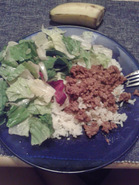
School has been back in session for two weeks and I have already been reminded of how difficult it can be to continue healthy behaviors as a student. Having 8:30 am classes discourages me from getting up early to exercise (working out in the morning is my preference). Unhealthy (but inexpensive) food options on campus provide fast and tempting meals that only aid in stopping the grumbling in my stomach temporarily.
So what do I do?
First, I remind myself that eating one slice of pizza or skipping a day of working out wont destroy all the good work I've done for my body this summer. Getting fit and healthy is not an overnight process and neither is becoming overweight and weak.
Next, I think of ways I can incorporate physical activity into my routine without having to wake up early when I am too tired. Walking from class to class rather than taking the bus is one way I get extra steps during the day. The university also offers group fitness classes which are fun and keep me moving for 45 minutes to an hour. I register for these classes once or twice a week and since there are penalties for not attending these classes, I am motivated to attend so that I don't lose my gym privileges.
I make sure to get a good breakfast every morning and I try to pack a sandwich or at least an apple and some Wheat Thins so that I have something to snack on between classes; this way I'm less likely to buy unhealthy foods throughout the day.
When I have time to cook, like today, I make sure to cook enough to last 2-3 meals so that I'll have dinner for the following few nights. Today I cooked rice and ground beef with salad and a banana on the side. I'm not a very good cook but I am able to make decent meals that I enjoy and that have some nutritional value.
Last week consisted of me eating a lot of unhealthy meals due to time constraints but now that I'm getting into the flow of things and have restocked my fridge, I am able to eat foods that are good for me and give me the energy to get through the day. This will be a good week.
So what do I do?
First, I remind myself that eating one slice of pizza or skipping a day of working out wont destroy all the good work I've done for my body this summer. Getting fit and healthy is not an overnight process and neither is becoming overweight and weak.
Next, I think of ways I can incorporate physical activity into my routine without having to wake up early when I am too tired. Walking from class to class rather than taking the bus is one way I get extra steps during the day. The university also offers group fitness classes which are fun and keep me moving for 45 minutes to an hour. I register for these classes once or twice a week and since there are penalties for not attending these classes, I am motivated to attend so that I don't lose my gym privileges.
I make sure to get a good breakfast every morning and I try to pack a sandwich or at least an apple and some Wheat Thins so that I have something to snack on between classes; this way I'm less likely to buy unhealthy foods throughout the day.
When I have time to cook, like today, I make sure to cook enough to last 2-3 meals so that I'll have dinner for the following few nights. Today I cooked rice and ground beef with salad and a banana on the side. I'm not a very good cook but I am able to make decent meals that I enjoy and that have some nutritional value.
Last week consisted of me eating a lot of unhealthy meals due to time constraints but now that I'm getting into the flow of things and have restocked my fridge, I am able to eat foods that are good for me and give me the energy to get through the day. This will be a good week.

 RSS Feed
RSS Feed
